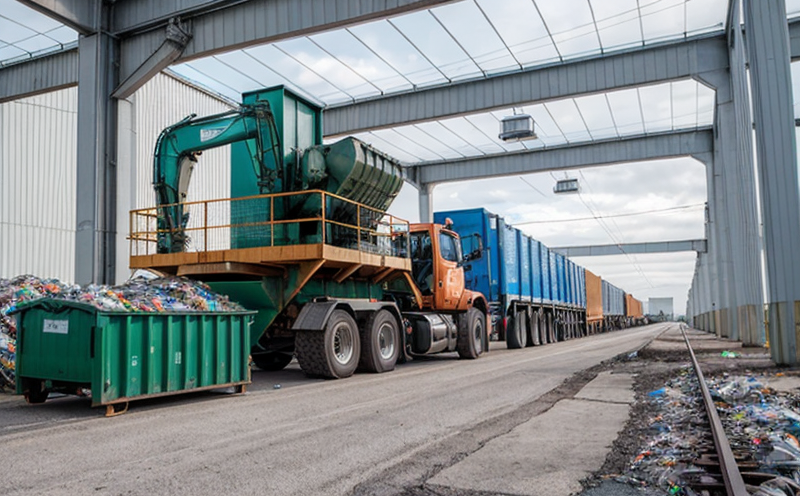ISO 13641 Compostability Testing of Recycled Materials
The ISO 13641 standard is a crucial tool in evaluating the compostability of recycled materials, ensuring that they meet environmental standards for biodegradation and decomposition. This test is particularly important in industrial manufacturing and processing as it helps companies transition towards more sustainable practices within their circular economy processes.
Recycling plays a pivotal role in reducing waste sent to landfills and minimizing raw material consumption, but not all recycled materials are equally compostable. ISO 13641 provides specific criteria for determining whether a recycled material can be effectively composted under industrial conditions. This standard ensures that products contribute positively to the circular economy by breaking down into natural elements without harming soil or water.
The testing process involves subjecting samples of the recycled material to controlled composting conditions, typically at temperatures ranging from 50°C to 60°C over a period of up to three months. The sample is analyzed for biodegradation rates and stability using various analytical techniques such as gas chromatography-mass spectrometry (GC-MS) and infrared spectroscopy (IR). Compliance with ISO 13641 not only enhances product sustainability but also facilitates market access, regulatory compliance, and consumer trust.
Compliance with this standard is essential for manufacturers looking to innovate in the realm of sustainable materials. By adhering to these stringent criteria, industries can ensure that their products contribute positively towards reducing environmental impact while maintaining product quality and performance.
- Certification: Companies that pass ISO 13641 testing are eligible for certification under relevant schemes like the Biodegradable Products Institute (BPI) in North America or similar bodies globally. This certification is critical for brands aiming to meet consumer expectations for eco-friendly products.
- Market Access: Compliance with this standard opens up new markets and opportunities, particularly in regions where there are regulatory requirements promoting the use of compostable materials in industrial applications.
The implications of passing ISO 13641 go beyond mere compliance; it sets a benchmark for excellence that can drive further improvements in recycling technologies and practices. For manufacturers, this translates into enhanced brand reputation, competitive advantage, and long-term sustainability benefits.
In conclusion, ISO 13641 compostability testing is indispensable for industrial manufacturing processes seeking to integrate sustainable practices effectively. It provides a clear path towards achieving environmental goals while maintaining product integrity and performance standards.
Why Choose This Test
Selecting ISO 13641 compostability testing is a strategic decision for industrial manufacturers committed to sustainability. It offers several advantages that go beyond mere compliance:
- Enhanced Sustainability: Demonstrates commitment to sustainable practices, aligning with growing consumer preferences and regulatory requirements.
- Market Differentiation: Provides a competitive edge by offering eco-friendly products in an increasingly environmentally conscious market.
- Regulatory Compliance: Ensures adherence to international standards, facilitating smoother compliance processes and avoiding potential penalties.
- Innovation: Encourages continuous improvement in recycling technologies and practices, driving innovation within the industry.
The test results are not just a mark of compliance but also an indicator of product quality and performance. By choosing this testing method, manufacturers can ensure that their recycled materials meet stringent environmental standards while maintaining high levels of functionality and durability.
Customer Impact and Satisfaction
The adoption of ISO 13641 compostability testing has a direct positive impact on customer satisfaction. Consumers are increasingly demanding sustainable products, and brands that demonstrate commitment to environmental responsibility through rigorous testing are more likely to attract and retain customers.
- Increased Sales: Products with certification from ISO 13641 tend to perform better in the market, leading to increased sales and customer loyalty.
- Better Reputation: A strong commitment to sustainability enhances a brand's reputation, fostering trust and credibility among customers.
- Customer Retention: Sustainable practices resonate with environmentally conscious consumers, contributing to higher retention rates.
In addition to these customer-focused benefits, ISO 13641 testing also improves internal processes. It encourages continuous improvement in recycling technologies and fosters a culture of innovation within the organization. This comprehensive approach ensures that every aspect of product development aligns with sustainable goals.
International Acceptance and Recognition
The ISO 13641 standard has gained widespread recognition across international borders, making it an essential tool for manufacturers aiming to penetrate global markets. Its acceptance in various regions underscores its relevance and effectiveness:
- Global Consistency: The standard ensures consistent evaluation of compostability across different geographical locations.
- Regulatory Compliance: Many countries have regulations that favor products meeting the criteria set by ISO 13641, ensuring compliance with local standards.
- Market Access: Certification under this standard can open doors to new markets and opportunities for businesses operating internationally.
The acceptance of ISO 13641 in international markets reflects the growing global consensus on the importance of sustainable practices. Manufacturers that adhere to these standards are better positioned to navigate diverse regulatory landscapes and capitalize on expanding market trends.





